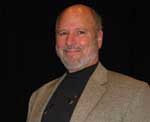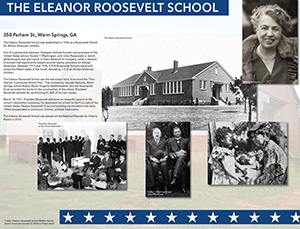By Jerry Klinger

 WARM SPRINGS, Georgia — The first-ever recognition of the extraordinary accomplishments of Jewish American Julius Rosenwald in a historical U.S. Presidential setting, was placed recently. The interpretive panel is located in President Roosevelt’s “Little White House” Warm Springs, Georgia.
WARM SPRINGS, Georgia — The first-ever recognition of the extraordinary accomplishments of Jewish American Julius Rosenwald in a historical U.S. Presidential setting, was placed recently. The interpretive panel is located in President Roosevelt’s “Little White House” Warm Springs, Georgia.
Text of the historical panel:
The Eleanor Roosevelt School
350 Parham St., Warm Springs, GA
The Eleanor Roosevelt School was established in 1936 as a Rosenwald School
for African American children.Out of a partnership between Tuskegee lnstitute founder and president of the
United States advisor Booker T. Washington, and Julius Rosenwald, a Jewish
philanthropist and part owner of Sears Roebuck & Company, came a network
of schools that significantly helped provide quality education for African
Americans. Between 1913 and 1936, 4,978 Rosenwald Schools were built
across the fifteen states of the South, educating 1/3 of all African American
children.The Eleanor Roosevelt School was the last school built. lt mirrored the “Five
Teacher Community School Plan.” The community, George Peabody, Warm
Springs School Board, Works Progress Administration, and the Rosenwald
Fund provided the funds for the construction of the school. President
Roosevelt assisted by contributing $1,000 of his own money.March 18, 1937, President Roosevelt delivered an impactful speech at the
school’s dedication ceremony. He dedicated the school to the First Lady of the
United States, Eleanor Roosevelt. A second building constructed in the early
1950s incorporated a lunchroom, kitchen, and two bathrooms.The Eleanor Roosevelt School was placed חס the National Register for Historic
Places in 2010.
Credit:
Eleanor Roosevelt School-Walker Family,
Jewish American Society for Historic Preservation (JASHP)
The JASHP funded historic panel came to fruition because of a partnership for good: the fundamental support of the Black Community of Warm Springs, Georgia and the positive receptivity of the Little White House.
Rosenwald, a humble man, did not believe in self-aggrandizement or perpetuating his name or actions for eternity. Though the fund was designed to self-liquate, which it did in the 1940s, the impact of his actions has shaped generations of Americans for the betterment of all.
Rosenwald did not do what he did in a vacuum but with the awareness of who he was as a Jew. He understood his responsibility to try and make things better, to use the gifts that God had given him.
Buried within his papers was an undelivered speech.
“This matter of civic duty looms larger than any one point of American Jewish life. It is the small cloud upon the horizon which portends danger for the future. I do not believe that economic, social, racial or cultural considerations will ever play a large role in American anti-Semitism. Social discrimination little interests the best Jews and is laughed at by the best non-Jews. But I take it, if the Jew fails in the discharge of his civic duty, he does not demonstrate to the nation that it acted wisely when it gave the Jew shelter and liberty and freedom. The Jew must be a pillar of civic well-being and moral capacity. He must be the one who in in every crisis will be right, militant for the right, the ethical, the spiritual, the best in national life. If he falls short of this standard, he will himself have brought into being the monster which will one day destroy him and unseat him from his position of safety in America… If distrust grows, nothing can save us. We can only save ourselves by creating a healthy atmosphere – both within our own group and on the outside – of trust and confidence in our integrity and our motives. It may not be an easy path to go; but it will be a path of safety and the assurance of safety to ourselves and to those who come after.
“The Jew need not be lost in America. He needs but demonstrate his usefulness in the highest sense of the term, and America will save him for himself.
“If the American Jew will be but true to his traditional powers for righteousness, if he be faithful to the best traditions of his past, and ready to do his best for this land of his adoption and nativity, he can play a big role in the ethicalization of public life in this country.”
*
Jerry Klinger is the President of the Jewish American Society for Historic Preservation.